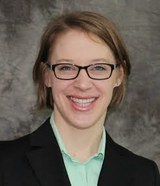Protein Assembly to Create Therapeutic Materials
DEPARTMENT OF CHEMICAL & BIOMOLECULAR ENGINEERING
Spring 2018 Seminar Series
"Protein Assembly to Create Therapeutic Materials"

Seminar Speaker: Dr. Julie Champion,
Associate Professor
Georgia Institute of Technology
Julie Champion is an Assistant Professor in the School of Chemical & Biomolecular Engineering at Georgia Institute of Technology and a member of the Institute for Bioengineering and Biosciences and the Bioengineering Program. She earned her B.S.E. in Chemical Engineering from the University of Michigan in 2001. Dr. Champion completed her Ph.D. in Chemical Engineering at the University of California Santa Barbara in 2007 as a National Science Foundation graduate fellow under the advisement of Samir Mitragotri. She was a National Institutes of Health postdoctoral fellow from 2007-2009 at the California Institute of Technology in the lab of David Tirrell. Professor Champion’s current research focuses on design and fabrication of therapeutic nanomaterials made from engineered proteins, and controlling the interactions between these materials and cells for applications in cancer, inflammation, and vaccines. Dr. Champion has received a BRIGE award from the National Science Foundation and the Women in Engineering Faculty Award for Excellence in Teaching, BioEngineering Best Advisor Award, and Junior Faculty Outstanding Undergraduate Research Mentor Award, all from Georgia Tech.